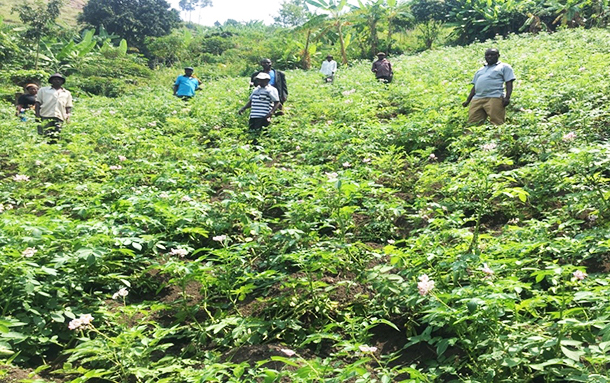Quality seed boost potato production in the Rwenzori region
Jul 15, 2020
She revealed that after introducing new potato production technologies and high yielding potato varieties in the district the production has increased.

AGRIBUSINESS | KABAROLE
Apollo Byaruhanga, is a potato farmer from Kiyombya Sub County in Kabarole district. He says that for many years, the situation has not been good. He was growing local potato varieties which he would save from the previous harvest.
"I would harvest only two bags (160kg) after planting 1bag (80kg) of potato seeds," he said.
Byaruhanga's woes continued until 2018 when the government of Korea through the Korean Program on International Agriculture (KOPIA-Uganda center) started supporting Rwebitaba Zonal Agricultural Research Institute (Rwebitaba ZARDI) one of the National Agricultural Research Organisation (NARO) Institutes to produce high quality potato seeds that are distributed to farmers in Rwenzori region.
According to him, they started by calling upon farmers who were interested to train on good agronomic practices such as planting in line, pests and disease control and use of fertilizers.
"I was among the first farmers and since then my production has been improving. Now from the 80kg potato seeds, I can harvest 7bags (560kg). I believe if more farmers picked the interest to learn, then potato production in Uganda will increase," he said.
Lawrence Akakugizibwe, another potato farmer from Kabonero Sub County in Kabarole also says originally, he was recycling seed which came with diseases that were not known to them that translated into very low potato yields.
However, after getting training on by NARO-KOPIA project, he has learnt about good quality seed and good agronomic practices. "I can now witness changes in production," he said.

Peninah Bahizi, the District Agriculture officer for Kabarole said that initially farmers were not practicing good agronomic practices. Many did not know that potatoes grow well in lines, or need fertilizers and also the quality of seed mattered.
She revealed that after introducing new potato production technologies and high yielding potato varieties in the district the production has increased.
"Kabarole district production department will continue to work with NARO and KOPIA to increase potato productivity which will lead to food security and increased house hold income in the region,'' Bahizi said.
Douglas Mutebi Jjemba, the head of potato research project at Rwebitaba ZARDI revealed that the KOPIA funding has increased the institute capacity to produce the first-class seed of good varieties for chips, crisps and steamed potatoes.
Jjemba revealed that a total of 435 farmers in 25 farmer groups have been trained by the project in clean seed potato production principles in the districts of Kabarole, Kamwenge, Kyegegwa and Kyenjojo.
"These will become professional seed producers who will sell clean seed (tubers) to other potato famers. Farmers who were claiming to be seed sellers in the area were producing table potato and selling the remains ‘Kacere' as seed," he revealed.
He added that most farmers were not utilizing fertilizers and other agrochemicals used to control pests and diseases which led to very low poor quality potato yields.
"The project has led to increase in yields form 7,000Kg/ha to 29,900Kg/ha in farmers' demonstration fields, which has changed farmers' perception towards the production methods of the crop for seed (tubers) and table (ware) potatoes," Jjemba said.
Dr. Park Taeseon, KOPIA Director says that this project ends in December 2020 but will be extended for another phase of three years.
He added that during the extension period, another set of screen houses will be built for the institute to boost early generation seed production.
"More demonstration gardens will be established in villages to help farmers practice seed production as a business, promote seed potato technologies to reach out to individual households, improve the productivity of potato in the demonstration villages and link the seed growers to seed markets within Uganda," he explained.
Dr. Robooni Tumuhimbise, the Director of Rwebitaba ZARDI said that since the introduction of the project, farmers' income through supply of quality potato seed (tubers) have increased.
"The funding from KOPIA has been used to train farmer groups in seed potato production and to construct a screen house (used to produce the first class of seed called Early Generation seed).
The starter material for seed production in the screen house are tissue culture plantlets which are raised in the laboratory," he said.
